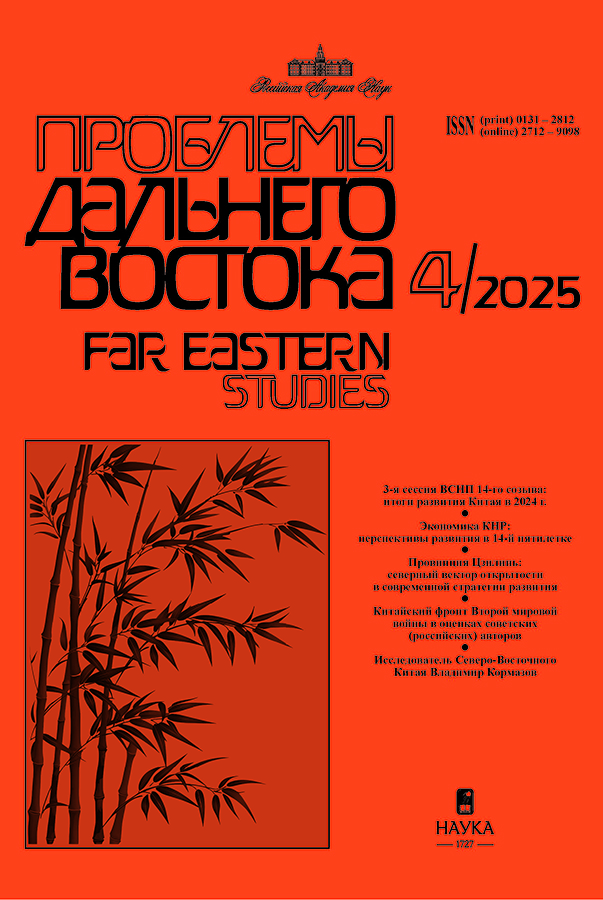Foreign Trade of Mongolia under Global Shocks
- Authors: Makarov A.V1, Makarova E.V2
-
Affiliations:
- Baikal Institute of Nature Using Management, Siberian Branch, Russian Academy of Sciences
- East Siberian State University of Technology and Management
- Issue: No 5 (2024)
- Pages: 84-96
- Section: Economics
- URL: https://rjmseer.com/0131-2812/article/view/676254
- DOI: https://doi.org/10.31857/S0131281224050066
- ID: 676254
Cite item
Abstract
The paper examines the current problems of Mongolia's foreign trade. It reveals that Mongolia depends on trade with two neighboring countries and has therefore suffered from border restrictions from China and Western states sanctions against Russia. It shows that the closure of the border with China in 2020 led to a sharp drop in Mongolian exports. In addition, Mongolia's dependence on mineral exports to China was exacerbated by its dependence on oil product imports from Russia. The sharp rise in oil product prices and supply problems in 2022 had a negative impact on the economic situation in Mongolia. China's completion of the COVID-Zero policy allowed Mongolia to exceed pre-pandemic mineral export volumes in 2023. The construction of new railway crossings will increase export volumes to China and other countries. Mongolia's implementation of measures to develop its own oil refining industry will lead to its elimination of dependence on Russian oil products in the coming years. In connection with the latter, a precipitous reduction in mutual trade up to a complete cessation should be expected. Therefore, the development of a long-term policy of bilateral economic cooperation is extremely relevant. As a key initiative that will ensure at least minimal volumes of Russian-Mongolian trade and maintain good-neighborly relations, the conclusion of a free trade agreement is proposed.
About the authors
A. V Makarov
Baikal Institute of Nature Using Management, Siberian Branch, Russian Academy of Sciences
Author for correspondence.
Email: bulagat@mail.ru
ORCID iD: 0000-0003-2982-8170
Ph.D. (Geography), Senior Researcher
Ulan-UdeE. V Makarova
East Siberian State University of Technology and Management
Email: elma79@yandex.ru
ORCID iD: 0000-0003-3537-3133
Ph.D. (Economics), Assistant Professor
Ulan-UdeReferences
- Makarov A.V., Makarova E.V., Andreev A.B. Mongol'skiy koridor: problemy i perspektivy razvitiya tranzitno-transportnoy seti Mongolii [Mongolian corridor: problems and prospects for the development of the transit transport network of Mongolia]. ECO. 2020. No. 10. S. 34–49. (In Russ.)
- Makarov A.V., Makarova E.V., Beshentsev A.N. Mongoliya: vneshnyaya torgovlya i razvitiye infrastruktury [Mongolia: foreign trade and infrastructure development]. Mirovaya ekonomika i mezhdunarodnye otnosheniya. 2023. No. 9. S. 68–78. (In Russ.)
- Marchenko O.V., Podkovalnikov S.V., Savelyev V.A., Solomin S.V., Chudinova L.Yu. Rossiya v Yevraziyskoy elektroenergeticheskoy integratsii [Russia in Eurasian Electric Power Integration]. Mirovaya ekonomika i mezhdunarodnye otnosheniya. 2018. No. 6. S. 18–29. (In Russ.)
- Saneev B.G., Popov S.P., Maksakova D.V. Modelirovanie razvitiya gazotransportnoy sistemy Mongolii s uchetom vozmozhnostey mezhdunarodnogo sotrudnichestva [Modeling the Development of Mongolia's Gas Transportation System Taking into Account the Possibilities of International Cooperation]. Izvestiya Rossiiskoy akademii nauk. Energetika. 2022. No. 2. S. 27–43. (In Russ.)
- Chepurkin Yu.V. Mezhdunarodnyy proyekt «Programma tekhnicheskoy modernizatsii i razvitiya AO «Ulan-Batorskaya zheleznaya doroga» do 2020 goda» [International project “Program of technical modernization and development of the Ulaanbaatar Railway until 2020”]. Byulleten uchenogo soveta AO «Institut ekonomiki i razvitiya transporta». 2016. No. 1. S. 19–26. (In Russ.)
- Batmunkh U., Diaz S., Jose L., Vnukova Yu., Sudan R. Mongolia Trade Competitiveness Diagnostic: Special Focus — Trade Opportunities in Digital Services. Washington DC: World Bank, 2023. 79 p.
- Borodyna O., Mami E., Nijhar I. Mongolia: towards sustainable economic recovery. ODI Emerging Analysis. London, ODI, 2023. 41 p.
- Doojav G.-O. Macroeconomic Effects of COVID-19 in a Commodity-Exporting Economy: Evidence from Mongolia. ADBI Working Paper, 2022. No. 1337. 33 p.
- Helble M., Hill H., Magee D. Mongolia’s Economic Prospects. Resource-Rich and Landlocked Between Two Giants. Manila: ADB, 2020. 322 p.
- Khashchuluun Ch., Dulguun T., Khorol-Erdene B., Manlaibaatar Z., Nyambaatar B., Oyuntugs D., Oyunzul Ts. Sustainable Mining Development. Ulaanbaatar: Economic research institute, 2021. 87 p.
- Nganou J.-P., Batmunkh U., Jambal G., Dorfman M.C., Chowdhury I.S. Mongolia Economic Update (Navigating Stronger Headwinds). Washington DC: World Bank, 2022. 66 p.
- Ragchaasuren G., Manlaibaatar Z., Oyunzul Ts., Khorol-Erdene B. Impact of COVID-19 on Mongolian Mining Sector. Ulaanbaatar: Economic research institute, 2021. 84 p.
- Yoshitaka H., Tuvshintugs B., Khashchuluun C., eds. Economic Dependence of Mongolia on Minerals: Consequences and Policies. Singapore: Springer, 2022. 202 p.
Supplementary files











